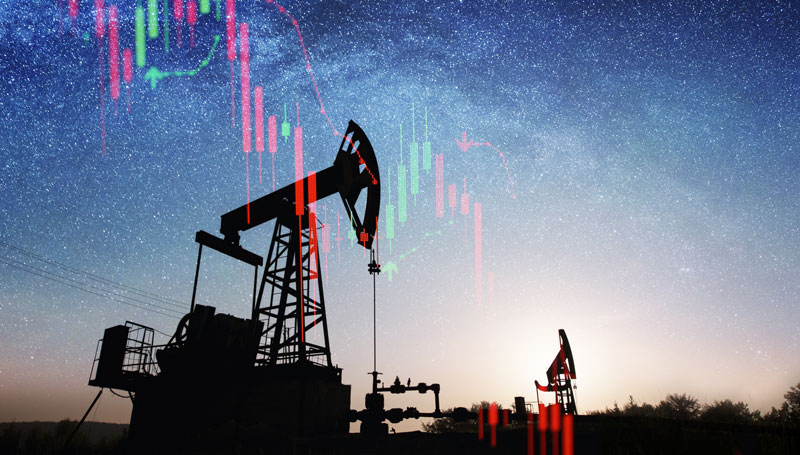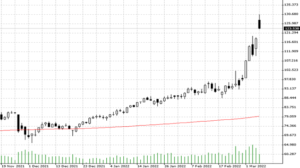

07.03.2022 – Stock markets dive, natural gas and oil jump up. That’s because the U.S. is now discussing an embargo on Russian energy. And Russian President Vladimir Putin has rattled his saber – fears of nuclear war are rife.
Brent shot up briefly to 130 dollars a barrel at the beginning of the week, see chart; West Texas Intermediate cost 130 dollars a barrel before profit-taking set in. The record of around 150 dollars from the summer of 2008 is no longer far away. The price of natural gas in Europe has reached new highs: On Monday, a megawatt hour was temporarily traded for 345 euros in the Netherlands – an increase of around 60 percent.

Source: Bernstein Bank GmbH
U.S. Secretary of State Antony Blinken is responsible for this. He said yesterday on NBC’s “Meet the Press” and other talk shows that the White House was consulting intensively – in an “active discussion” – with allies on whether to impose an embargo on Russian oil imports. Meanwhile, a variant emerged that the U.S. could also suspend imports from Russia on its own.
Stagflation and recession
Either way, all of this continues to fuel inflation – you see it at the gas pump. And thus we slide into stagflation – falling growth, rising prices. Wall Street great Ed Yardeni commented, “for the U.S. economy, we now see stagflation, with persistently higher inflation and less economic growth than expected before the war. (…) For stock investors, we think 2022 will continue to be one of this bull market’s toughest years.” In addition, there is the risk of a new Russian default, as in 1998, which led to the collapse of the hedge fund LTCM. Brent is not likely to bounce back to the 200-day line until there is a global recession, see above.
Shares in reverse gear
First, however, the stock market said: Risk Off. The DAX dipped almost five percent to 12,438 points before recovering. On Friday, the German benchmark index had already slipped by 4.4 percent. Meanwhile, the MSCI Asia-Pacific index has reached a bear market with a minus of about 20 percent since the high from February 2021. Investors also fled to the safe haven of U.S. government bonds. The Swiss franc also strengthened, falling below parity for the first time since January 2015. The Swiss National Bank said it was ready to intervene.
Fear of nuclear war
In addition to the energy hammer, fears of a third world war also weighed. Putin put nuclear forces on alert, sent nuclear submarines to the Barents Sea and mobile missile units on maneuvers in Siberia. We are curious to see when the first Western states will buckle, go back to business as usual and allow Moscow to slaughter Ukraine.
For the stock market, the following remains true: Any escalation in Ukraine means oil long, gold long, stocks short. Kiev’s capitulation and a new Western cuddling course turns the picture. We keep the matter for you in the eye!
Important Notes on This Publication:
The content of this publication is for general information purposes only. In this context, it is neither an individual investment recommendation or advice nor an offer to purchase or sell securities or other financial products. The content in question and all the information contained therein do not in any way replace individual investor- or investment-oriented advice. No reliable forecast or indication for the future is possible with respect to any presentation or information on the present or past performance of the relevant underlying assets. All information and data presented in this publication are based on reliable sources. However, Bernstein Bank does not guarantee that the information and data contained in this publication is up-to-date, correct and complete. Securities traded on the financial markets are subject to price fluctuations. A contract for difference (CFD) is also a financial instrument with leverage effect. Against this backdrop, CFD trading involves a high risk up to the point of total loss and may not be suitable for all investors. Therefore, make sure that you have fully understood all the correlating risks. If necessary, ask for independent advice. CFDs are complex instruments and are associated with the high risk of losing money quickly because of the leverage effect. 68% of retail investor accounts lose money trading CFD with this provider. You should consider whether you understand how CFD work and whether you can afford to take the high risk of losing your money.7
